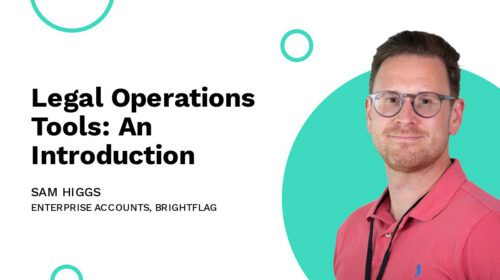AI for General Counsel: 3 Use Cases to Improve Legal Strategy
Since OpenAI launched ChatGPT in 2022, the number of new AI tools and offerings hitting the market has grown exponentially. Today, business leaders are constantly bombarded with new concepts, capabilities and “AI must-haves” promising to make legal operations more efficient and profitable.
But as we all know, there’s a lot of noise in the AI space. So, figuring out which tools improve productivity and enhance the value your team delivers to the business is far from straightforward.
For General Counsel, that challenge is especially acute. GCs are increasingly expected to drive business strategy and advise the C-suite—all while still managing risk amid increasing legal, regulatory, and technological complexity. In that environment, the pressure to use AI to improve workflows is real, but knowing where it will make the most impact is what really matters.
In this blog, I’ll help you cut through the hype by closely examining how AI tools like Brightflag’s Enterprise Legal Management platform (ELM) can make a practical difference across key legal workflows.

Use Case #1: Strategic Insight into Legal Spend
Legal spend can be notoriously tricky to forecast. Reactive spend (e.g. on unanticipated litigation or urgent internal investigations) certainly plays a role in that uncertainty. But it’s often tricky to forecast spend for ongoing work as well.
Timelines shift, the scope of legal work changes, and billing issues occasionally crop up.
It all impacts the budget, but often leadership only becomes aware of the full extent of these impacts “after the fact.” For General Counsel and Chief Legal Officers, the knock-on effect is that it becomes difficult to justify additional spending. Or to showcase how legal is working to implement broader business improvements, like resource and workflow optimization.
The solution is enhancing clarity around legal spend, and this is where a dedicated in-house legal AI tool can make a difference.
A legal generative AI tool like Ask Brightflag, for instance, allows your team to use natural language prompts to access information about legal work and spend immediately.
This allows you to instantly answer questions like:
- “Which of our outside counsel partners are providing the most cost-efficient service?”
- “What are our top matters by spend?”
- “How much is each of our law firms invoicing?”
Having those types of insights on tap empowers you to identify cost sinks and poor resource allocation. It also enables data-driven decision-making around budgeting and resourcing, and near-instant answers to the C-suite’s most pressing questions. Additionally, it helps you align the legal department with business-wide priorities around cost control. And all of these factors ultimately contribute to a shift in how the legal department fundamentally functions—and how it’s viewed by other stakeholders.
Instead of being seen as a cost center, legal becomes a valued partner across the broader business in cost and resource optimization. And a core contributor to shaping corporate strategy.

Use Case #2: Streamlined Legal Tasks and Workflows
For most in-house legal teams, routine admin work is an area that torpedoes efficiency. In-house legal professionals can spend hours on tasks like invoice review or reporting—time that could be better spent on high-impact, high-value strategic work.
Fortunately, automating routine tasks and workflows is one of the best use cases for AI models. There are several capabilities worth looking out for in this area, but some of the most useful include:
Automated Invoice Review
Artificial intelligence tools can act as a “first reviewer” on incoming invoices, introducing automation to the process of checking details like:
- Entity name
- Proper application of rates and discounts
- Outside counsel guideline compliance
Integrated with a full-service ELM, that information can be used to answer more strategic questions, such as: “Which vendors routinely fail to follow our billing guidelines?” or “How much of our litigation spend goes to discovery?”
Invoice Summaries
Tools like Brightflag’s Invoice Summaries feature add another layer of utility, creating AI-generated summaries of the work done by outside counsel and sending these details for review. Recipients can then review work and approve invoices directly from their inbox, taking a more detailed look only as needed.
Automated Matter Updates
AI can also be invaluable for streamlining how matter updates and queries are handled. Using AI technology, legal leaders can speed up the process of getting status updates from internal team members and outside counsel, simplifying reporting. Like automated invoice review, this saves time that would otherwise be spent collating data for reports or chasing down matter information.
Other Use Cases
Many legal teams are also adopting tools for AI-driven e-discovery (for example, simplifying the process of tagging, sorting and retrieving documents), legal spend analysis (including analyzing trends and vendor performance) and legal chatbots and assistants.
But across all these contexts, the core value proposition stays the same. By automating routine tasks, AI tools speed up workflows and reduce drudgery, allowing your team more time to tackle impactful and strategic work.
Use Case #3: Improved Contract Review Processes
Anyone who has worked in legal for any length of time knows that the contract review processes can be time-consuming. From a legal perspective, it’s imperative to “get it right” and protect the business. From every other department’s (and often business leadership’s) viewpoint, lengthy contract review processes slow down revenue generation, stall procurement, and draw out the hiring cycle—with the result being that the legal team can be seen as a bottleneck, rather than a business enabler.
By adopting AI, however, many legal departments are speeding things along dramatically. AI trained on legal data and legal research can conduct an in-depth first pass review: checking contracts for ambiguous clauses, highlighting unusual terms and identifying deviations from standard language. It can also speed up redlining and streamline processing high-volume, low-risk agreements.
Top legal AI systems come equipped with “clause libraries,” allowing them to recommend fallback clauses appropriate to contract type, and they have the contextual knowledge to flag risk areas in the contract for human review. Some AI platforms can even draw up standard or bulk contracts, removing one of the most time-consuming and unprofitable tasks from in-house counsel’s plate. All of which can lead to massive efficiency gains.
The most recent EY Law GC study, for example, found that implementing tech tools like AI can improve efficiency by more than 60%, and increase the number of cases or contracts each attorney handles by 30%.
The other obvious upshot here is business impact. Speeding up the document review and contracting process means closing deals faster and positioning legal as a partner to accomplish the other team’s objectives. It reduces the friction that slow legal processes often cause. And it ensures that the legal department is viewed as a valued contributor to bolstering the bottom line.
Building a Data-Driven, Strategic Legal Function
The use cases and tools presented here are just the tip of the “AI iceberg.” The pace of change in this space is accelerating rapidly, and it’s imperative for GCs and CLOs looking to transform their function to ensure their departments are keeping up.
Implementing this tech effectively, however, requires a thoughtful approach to AI adoption. AI doesn’t replace human judgement and effort. It supplements it. It offers new ways to reclaim time, surface strategic insights, and drive business outcomes. The key to maximizing those outcomes is to ensure your team is investing in the right tools and that those tools form a seamless part of the legal function’s larger tech stack and process flows.
That’s why, at Brightflag, we believe that you need a fully integrated legal AI strategy solution to get the most from AI-powered systems. One that can handle everything from matter management to e-billing, analytics, and vendor management — all in one place.
Brightflag’s comprehensive AI-powered enterprise legal management platform is designed with those principles. It provides legal leaders with complete visibility into legal work and spend, and gives them the in-depth insights they need to operate more strategically and effectively. Our focus on implementing new AI features that add the most value for our clients also means that every legal team we work with stays on the cutting edge of legal AI tech.
Keen to see how Brightflag can support your legal transformation? Book a demo. And let our friendly team walk you through our one-stop solution for legal AI.



